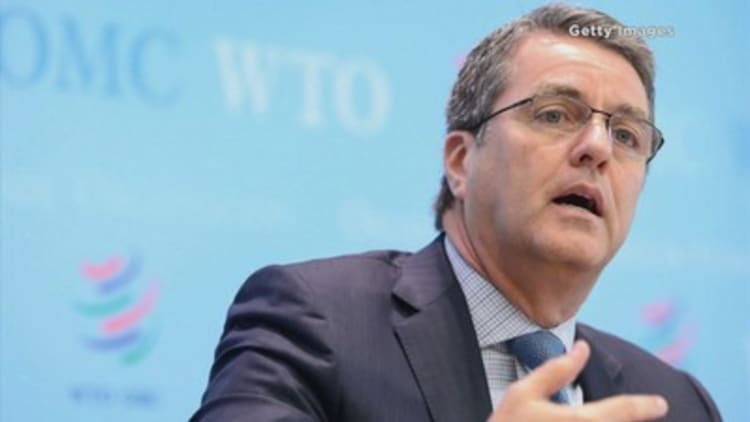
The slump in global energy prices means oil-producing countries face a "clear need" to diversify their economies and improve competitiveness, the World Economic Forum (WEF) said in its latest competitiveness survey.
Gulf countries reliant on oil exports have struggled since the rout in energy prices began in July 201. For example, the International Monetary Fund sees Saudi Arabia's economy growing by 1.2 percent this year, down from 3.5 percent in 2015 and 3.6 percent in 2014.
"The drop in energy prices has heightened the urgency of advancing competitiveness agendas across the Arab world … There remains a clear need for all energy-exporting nations to further diversify their economies and for much greater effort to improve basic competitiveness," WEF said in its annual report on global competitiveness unveiled on Tuesday.
The Gulf States were the weak performers in WEF's global competitiveness index, with only three economies in the top 30: The United Arab Emirates (16), Qatar (18) and Saudi Arabia (29).
WEF, which holds a prestigious annual forum in Davos, Switzerland, ranked all countries by competitiveness, using measures such as infrastructure, macroeconomic environment, financial market development and technological readiness.
2016's top performers were the same as last year, with Switzerland, Singapore and the U.S. claiming the top three spots. The Netherlands was the top European Union performer at no. 4, with Germany at no. 5 and the U.K. at no. 7 (based on data from before the Brexit vote in June).
Top 10 most competitive economies:
- Switzerland
- Singapore
- US
- Netherlands
- Germany
- Sweden
- UK
- Japan
- Hong Kong
- Finland
Spain, Italy and Greece were less competitive than their northerly neighbors, ranking 32nd, 44th and 86th respectively. France came in at 21st.
"While European economies continue to dominate the top 10, there remains no end in sight for the region's persisting north-south divide … For all economies in Europe, maintaining and improving prosperity levels will depend heavily on their ability to harness innovation and the talents of their workforces," WEF said.
Among the major emerging markets, China ranked 28th, India came in at 39th and Russia was 43rd. Brazil was lower, at 81st.
Protectionism
WEF warned that countries' openness to international trade has been waning for the last decade.
Republican presidential candidate Donald Trump has criticized the North American Free Trade Agreement between the U.S., Canada and Mexico and avowed to "never-ever sign bad trade deals." He has also repeatedly accused China, with whom the U.S. had a goods trade deficit of $191 billion for the first seven months of this year, of trade violations.
Across the Atlantic, the U.K. voted to quit the European Union, which provides for free movement of goods, services and labor between member countries, three months' ago.
"Declining openness in the global economy is harming competitiveness and making it harder for leaders to drive sustainable, inclusive growth," Klaus Schwab, founder of WEF, said in Tuesday's report.
The report cited rising non-tariff barriers, onerous customs procedures and rules around Foreign Direct Investment (FDI) and foreign ownership as example of rising protectionism. This was most marked in high- and upper-middle income countries, the body said.

In July, the head of the World Trade Organization (WTO) said growth in international trade was low and attributed this to rising anti-globalization sentiment.
"I think that as far as trade is concerned, we are not worse than we were before, but we are definitely not much better. We will be growing now at the slowest pace than the last 30 years," WTO Director-General Roberto Azevêdo told CNBC.
"It is still sluggish and the problem is this new anti-trade rhetoric, anti-globalization rhetoric. It doesn't help, because it may spell what is to come in terms of policies, so that is definitely bad news," he added.

